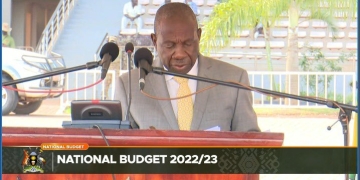
Maj. Gen David Oyite Ojok is believed to have single handedly propped up the Obote II regime as it fought multiple rebellions in the country.
The man whose death marked the beginning of the end of the Obote II regime.
But he was much more than that.

Born in 1940 in Loro, Northern Uganda, Ojok joined the Uganda Rifles (UR) in 1963.
He then trained in the United Kingdom at the Mons Officer Cadet School and later on at the Staff College Camberley.
Between 1963-71, he served in various junior roles rising to the rank of Major.


On Jan 24 1971, Maj Ojok was part of the team including Lt. Col Tito Okello, IGP Erinayo Oryema and others that was tasked with arresting Idi Amin. The group was overseeing the operation at Uganda Parliament buildings when Amin’s loyalists overpowered the arrest teams and launched a coup.


Soon Parliament was surrounded by pro-Amin troops who began a search looking for Ojok and his comrades.
Many versions have emerged on how the group escaped capture but whats known is that Ojok spent the day of the coup holed up in Parliament before escaping to exile in Tanzania.

Whilst in exile in Tanzania, rumours began circulating that Ojok was sneaking into Kampala to party and then asking for the bills to be sent to President Amin.
In 1979, Ojok emerged as a commander in the UNLF force that had allied with the Tanzanian army to oust Amin from power.
Hailed as a hero and liberator, Oyite emerged as one of the powers behind the throne as army chief in UNLA and member of the powerful Military Commission.
This power was put to the test when President Binaisa dismissed Ojok as army chief but it instead led to his own downfall.

Following the Dec 1980 elections, Obote was declared President and Ojok was appointed chief of staff UNLA.
His first objective; to deal with the major rebellions that had sprung up in central Uganda led by among others ex-ministers Yoweri Kaguta Museveni (NRA) and Andrew Kayira (UFM).


For the next 2 years, Ojok’s experience/tactics proved effective and kept the rebels at bay.
But his life was suddenly cut short when his helicopter burst into flames shortly after take off in the Luwero Triangle on December 2 1983.
He was only 43 yrs old.

His death is believed to have marked the beginning of the fall of President Milton Obote’s second government (1981-1985) as cracks began to emerge within the UNLA army and central government culminating into the July 1985 coup










